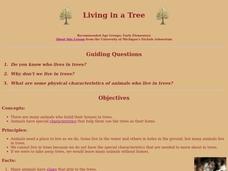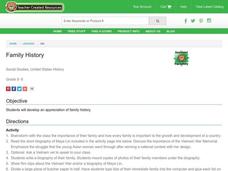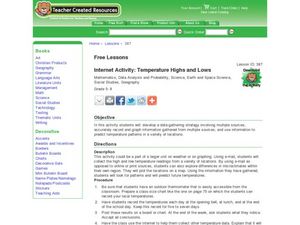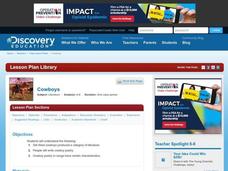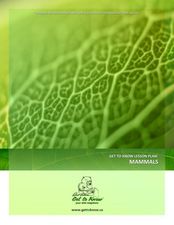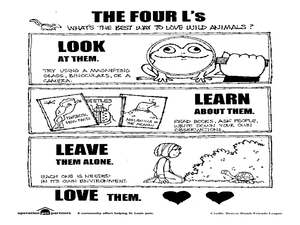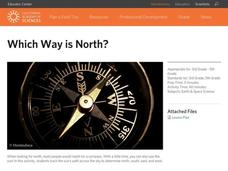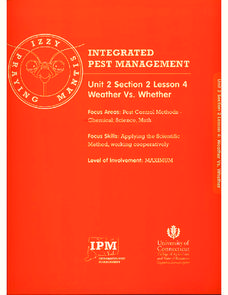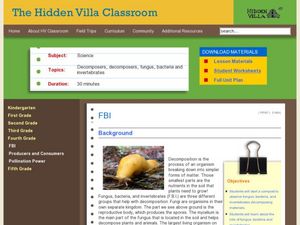Curated OER
Paint & Paper: Free-Form Musical Art
Students explore painting their feelings as they enjoy this musical art activity. In this early childhood visual art activity, students use paint to respond to music.
Curated OER
Living in a Tree
Students explore animals that live in trees. In this nature and biology lesson, students go outdoors and make observations about animals and their unique body parts that help them to live in trees. Students create drawings as they...
Curated OER
Please the Trees, But Not These, Please!
Students study trees. In this forestry lesson, students complete a variety of activities where they learn the basic parts of a tree and their functions.
Curated OER
Dissecting Owl Pellets
Students explore owl pellets. In this animal science lesson, students use owl pellet dissection kits to dissect one owl pellet. Students use a magnifying glass to identify the foods that the owl ate.
Curated OER
Get to Know- Insects, Spiders and Others
Students investigate live insects. In this insects and spiders lesson, students work in groups to explore the outdoors and capture insects. Students observe, discuss and record information about the insects they discover. Students...
Curated OER
Get- To Know Mammals
Students take a field trip and record information about mammals. In this mammals lesson, students hunt for tracks, waste, or other evidence that a mammal exists in this habitat. Students complete a worksheet on the evidence they have found.
Curated OER
Family History
Students appreciate how families are important to the expansion and progress of a country. In this biographies instructional activity, students read a biography and write their biographies including photos. Students create family trees.
Curated OER
Temperature High and Lows
Students gather high and low temperature readings through email. For this temperature graphing lesson, students use a spreadsheet to input data for a graph. students interpret the graphs to compare and contrast the data from different...
Curated OER
Cowboys
Young scholars analyze cowboy literature. In this United States history and literacy lesson, students listen to a variety of cowboy songs and poetry, view the video "Rediscovering America: The Real American Cowboy," and view related...
Curated OER
Chemquest: Physical Changes or Chemical Reactions
Students explore physical and chemical changes. In this chemistry lesson plan, students will go outside to observe changes seen in nature. Students will then work in the lab to identify changes at different stations prior to doing a...
Curated OER
Pollinator Habitats
Students read and discuss background information included with this lesson plan. They brainstorm the best sources for developing a list of native or migratory pollinators. Students work in groups to design habitats based on information...
Curated OER
Solar S’Mores
Learners use the energy of the sun to make s'mores. In this solar energy lesson, students gather the listed materials and follow the procedures to find out if they can make s'mores using solar energy.
Curated OER
Flying Wing
Fifth graders create a flying wing from a pastry tray. In this flying wing instructional activity, 5th graders understand how the shape of the wind affects flight. Students compare the flying wing to the zanonia seed in nature. Students...
Curated OER
To Protect Your Streams, Protect Your Mountains
Students build and experiment with a watershed to understand the effects of pollution. In this movement of water lesson, students work in groups creating rock formations and change the viscosity of the liquids falling down the mountain....
Curated OER
Get to Know: Mammals
Students discover the mammals in their community. In this animal lesson, students survey their school grounds for signs of mammals. Students examine tracks, droppings, and other signs of wildlife to learn more about the animals and their...
Curated OER
Wonderfully Wild Unit the four L's of Wildlife
Students appreciate the natural environment. In this "four L's" lesson, students observe, reflect and appreciate unique ecosystems and how they help sustain life. Students create posters with the four L's.
Curated OER
Automobile-Accident Reconstruction
Students investigate an accident and relate it to math. In this trigonometry lesson, students measure the accident scene, the friction produced, and the speed from the skid marks. They create a poster of their findings.
Curated OER
Hula Hoop ABC Relays
Adding hula hoops to any activity can present a fun challenge. This worksheet explains how to conduct an activity that combines the recognition of capital/lowercase letters and a hula hoop relay. Outside on the playground, each student...
California Academy of Science
Which Way is North?
Who needs a compass to find cardinal directions? Just place a stick in the ground and record the movement of its shadow over the course of a day. Then, measure the shadow lengths in order to determine a north-south line. A simple...
University of Connecticut
Weather Vs. Whether
Monarch butterfly populations have decreased by 90 percent over the past 20 years due to misuse and ineffectiveness of some pesticides. Given the challenge to increase pesticide safety and effectiveness, the class, through discussion,...
Curated OER
Fossil Formation
A fossil is worth a thousand words! Individuals craft their own amber fossil of an insect in addition to molds and casts of seashells. A third activity takes the lesson a notch higher: Learners measure stride lengths between tracks and...
Wild BC
Greenhouse Gas Guzzlers
Teams of six to eight players imagine that they are driving in a vehicle and collect balls that represent carbon dioxide emissions based on their different activities. "Greenhouse Gas Guzzler" cards tell teams how many balls to collect...
Prestwick House
Vocabulary Activity Sheet
What does it mean to stream a program? How do you know if you're watching a mash-up? If you don't know these words, reach for your handy Merriam-Webster dictionary, because they're there! A series of fill-in-the-blank questions prompt...
Curated OER
FBI
Fourth graders experiment with compost. For this Science lesson, 4th graders begin a worm compost as well as an outdoor compost. Students discuss decomposition.



